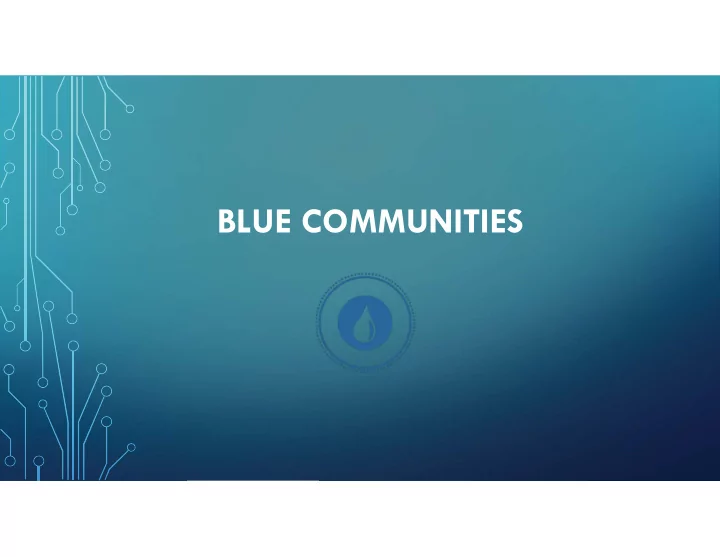

BLUE COMMUNITIES
What is a Blue Community? The Blue Communities Project encourages municipalities and Indigenous communities to adopt a water commons framework by: 1. recognizing water and sanitation as human rights 2. banning bottled water in municipal facilities and at municipal functions 3. promoting publicly financed, owned, and operated water and wastewater services
UNITED NATIONS & CANADA… & � in 2010, the United Nations passed a resolution recognizing the human rights to water and sanitation and acknowledged that clean drinking water and sanitation are essential to the realization of all human rights � in 2011, the United Nations recognized human rights to water, sanitation, and for governments to establish, monitor and provide accountability that ensure affordable services � in 2012, Canada recognized the human rights to water and sanitation at the Rio+20 United Nations Conference on Sustainable Development � But Canada has yet to develop a plan of action to implement these rights
RECOGNIZE WATER AND SANITATION AS HUMAN RIGHTS Water is essential to life – no one should be able to control it or exploit it for profit. The human right to water entitles everyone to sufficient, safe, accessible water for personal and household use. The human right to sanitation would ensures that everyone has access to toilets or latrines that provide privacy and a safe and dignified environment that is physically accessible, affordable and culturally sensitive.
CANADIAN MUNICIPALITIES AND THE RIGHTS TO WATER AND SANITATION Responsibility for water is shared between municipal, provincial and federal governments. This means the right to water must be recognized and implemented at every level of government. Official recognition of the rights to water and sanitation at the municipal level would cement these principles.
A WATER COMMONS FRAMEWORK WOULD… � prevent a pricing scheme that would limit access to drinking water and wastewater services � ensure all residents have equal access to adequate supplies of safe, clean water and sanitation � provide citizens with information on their water supply and the operation of their water services � promote water conservation, treatment, reuse and source protection to enhance water quality and quantity
BEST PRACTICES � 40 countries globally have enshrined this declaration of rights to water and sanitation in national constitutions or national legislation, including … � in 2007, the Union of Nova Scotia Municipalities recognized “access to clean water” as a “basic human right” � in 2010 the Northwest Territories recognized the right to water, and � In national constitutions or national legislation this declaration is included in India / South Africa / Mexico / France / United Kingdom / Uruguay
BAN BOTTLED. WHY? … � it represents a private takeover of the water commons. Corporations take free-flowing water from its natural state – or, sometimes, treated municipal water – put it in plastic bottles, and sell it at exorbitant rates � Aquafina admits using municipal water systems in Mississauga and Vancouver � in the United States, scientific evidence suggests almost 50% bottled water comes from municipalities
Bottled water was a niche market, and the consumption increased dramatically as it became viewed as a product for sale. It profited enormously by selling it as a “clean, safe, and natural alternative” to public water.
Water-bottling companies next to nothing to extract water from springs and aquifers. Whole watersheds are now under threat from this practice In 2015 a study found only 6% of global groundwater around the world is renewable Also in 2015, a poll commissioned by the Munk School of Global Affairs Program on Water Issues found that 96% of Canadians said it is important that groundwater use remain sustainable and not be exhausted by overuse
DID YOU KNOW….. In order to persuade people to spend up to 3,000 times what they spend on tap water, bottled water companies advertise their products as a safer and healthier alternative Nothing could be further from the truth! Bottled water is regulated as a food product under the Canadian Food Inspection Agency Bottling plants are inspected on average only once every three years!
REGULATION OF TAP WATER Municipal tap water is tested continuously during and after treatment, and during distribution Example: � Toronto samples every four to six hours � Halifax samples six to eight times daily � Nanaimo tests daily � and in Cobourg, Lakefront Utilities Services staff collect samples weekly. Cobourg has been forward thinking in using the process of Osmosis in our water systems – a more sustainable practice
DO WE NEED BOTTLED WATER? In an era when the world is dealing with the impacts of climate change, the bottled water industry requires massive amounts of fossil fuels to manufacture and transport MORE Canadians are moving to the tap and rejecting bottled water A surge of Canadian municipalities, school boards, colleges and are banning the sale and purchase of bottled water
DITCH BOTTLED WATER � in 2009, the Federation of Canadian Municipalities (FCM), voted in favour of a resolution to encourage all Canadian cities to phase out the sale and provision of bottled water in municipal facilities and at municipal events � Associations of Municipalities of Ontario (AMO) is addressing water taking policies to protect groundwater and prioritizing uses and increasing water use tracking and reporting. � in 2011, the Union of B.C. Municipalities voted overwhelmingly in favour of a Blue Communities resolution at their annual convention.
THANK YOU On behalf of the citizens of The Town of Cobourg, Council of Canadians – Northumberland Chapter, Blue Dot, Sustainable Cobourg, former Environmental Active Transportation Advisory Committee, and the Blue Communities Program, we thank Mayor John Henderson, members of Town Council, and staff for your consideration in adopting a declaration to … � Recognizing water and sanitation as human rights � Banning the sale of bottled water in public facilities and at municipal functions � Promoting publicly financed, owned, and operated water and wastewater services … And join in as a Blue Community
Recommend
More recommend